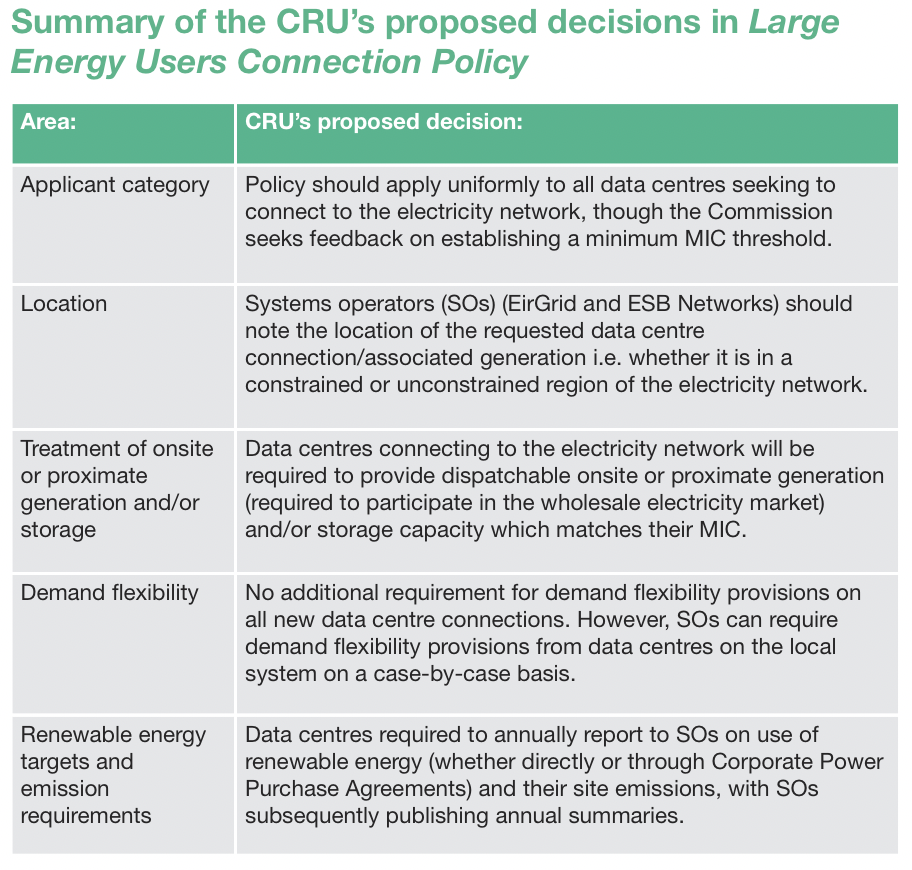
In late February 2025, the Commission for Regulation of Utilities (CRU) published a much-anticipated proposed decision paper on Large Energy Users Connection Policy. While cautiously welcomed in some quarters, in the absence of a decision that data centres must be powered by renewable energy, it has faced recrimination in others.
Given the “step-change” increase in electricity demand among large energy users – from 5 per cent of total energy consumption in 2015 to 21 per cent in 2023 – primarily driven by data centre expansion, in 2024, the CRU published Review of Large Energy User Connection Policy consultation paper.
Subsequently, the CRU’s proposed decision paper on the Large Energy Users connection policy is intended to establish a potential pathway for larger energy users, or data centre customers, to submit new connection applications to the electricity grid. Regard for security of supply and network constraints are, it says, balanced against the minimisation, “where possible”, with the impact on the national climate objective.
Responses to the proposed decision paper can be submitted until 17:00 on Friday 4 April 2025, with an informed decision to be published “later in 2025”.
New connections
Previously, in 2021, the CRU’s Direction to the System Operators related to Data Centre grid connection processing: Decision had asserted: “There is an evolving, significant risk to electricity security supply in Ireland. A significant contributory factor to this risk is a large increase in electricity demand presented by the growth of the data centre industry.”
As such, the CRU issued directions to EirGrid, as the TSO, and ESB Networks, as the DSO, to implement measures which would prioritise the processing of data centre connection applications on a case-by-case basis.
Legal basis
Now, however, the regulator says: “The current provisions under the Climate Action Act do not provide a sufficient legal basis to allow the CRU to explicitly mandate specific emissions reduction and offsetting measures (e.g. to require that connection applicants put in place arrangements to ensure that emissions associated with a demand connection are fully abated from the time of connection or on a set trajectory).”
This conclusion, which followed a legal review, indicates that CRU does not believe it has a mandate to “deliver a connections policy which requires explicit emissions reduction and offsetting measures”.
As such, the CRU notes its intention to “take more limited actions in respect of emissions”, including requiring data centres to regularly report on renewable energy consumption and emissions to system operators.
Simultaneously, the CRU has proposed that data centres will be required to provide onsite or proximate generation and/or storage which matches their Maximum Import Capacity (MIC). This generation is set to be separately metered and required to participate in the wholesale electricity market.
However, this conclusion begs the question: Which body does have “sufficient legal basis” to determine how data centres can connect to the electricity grid while complying with the national climate objective?
Gas connections
Furthermore, on 14 January 2024, when the Review of Large Energy Users Connection Policy Consultation was launched, the CRU called on industry, government departments, semi-states, and agencies to help “identify the means by which we can achieve these twin goals of decarbonisation and economic growth, and the policy, regulatory and other cross-agency measures that can facilitate this”.
Initially, as per the CRU, the policy review and consultation process were intended to “provide a new pathway for Large Energy User connections to the electricity and gas systems”. This language is repeated in its February 2025 proposed decision paper.
Simultaneously, however, the CRU’s paper states: “The CRU is not proposing to introduce any new decisions relating to connections to the gas network as part of this review process but acknowledges that further policy analysis and work is required on this.”
Reaction
Speaking to RTÉ’s Morning Ireland on the morning the paper was published, CRU Commissioner Tanya Harrington emphasised: “We are providing clarity to the [data centre] sector on how it can connect to the grid over the coming years… Our draft decision is very much working towards the achievement of government’s twin objectives of decarbonisation and digitalisation…
“We are trying to provide a clear set of signals for investors to come into this market. It is a matter for the data centres themselves to choose how they fuel and power themselves… There is a number of incentives to incentivise data centres who are constructing to do so in the greenest fashion possible.”
Speaking to eolas Magazine after the CRU’s paper was published, Michael McCarthy, Ibec’s Director of Cloud Infrastructure Ireland (CII) noted: “[The] publication introduces significant policy changes and obligations which industry will need time to analyse. It is important for the cloud industry to have clarity around proposed policy changes in this area to inform the future role the sector will play in Ireland’s economic and sustainable future. The CII will continue to constructively engage in the consultation process over the coming weeks”.
John Reilly, Head of Renewable Energy in Bord na Móna said: “We acknowledge the proposed decision paper published this week by Commission for Regulation of Utilities (CRU) on the Large Energy Users connection policy. Bord na Móna intends to share a submission as part of the live consultation process in the coming weeks including detail on the role that our Eco Energy Park offering can play in supporting low carbon growth of high energy demand sectors including tech, manufacturing, pharmaceutical, agrifood, transport and logistics.
“By co-locating a variety of renewable and low-carbon energy generation assets alongside large energy users within our energy parks, we hope to facilitate industrial and economic growth while supporting Ireland’s achievement of its climate action goals”.
Also speaking with this publication, Matt Kennedy, Head of Client Transformation in IDA Ireland, asserted: “Recognising the essential role data centres play in driving our digital economy, it is crucial to adopt a balanced strategy that supports the growing energy demands of data centres, while also safeguarding the competitiveness, sustainability, and security of our energy supply.
“This approach is central to the Government’s Programme for Government 2025 commitment to create a comprehensive plan for accelerating energy generation, enhancing connectivity, and streamlining planning processes.”
Meanwhile, in comments also made to eolas Magazine, Paul Deane, senior lecturer in clean energy futures at University College Cork, said: “The [CRU’s] decision creates uncertainty about which state agencies have the legal responsibility to deliver Ireland’s national climate law. Ultimately, it is a missed opportunity to oblige new data centre developments to use clean, indigenous energy from Ireland rather than giving them the choice to use polluting fossil fuels.”






